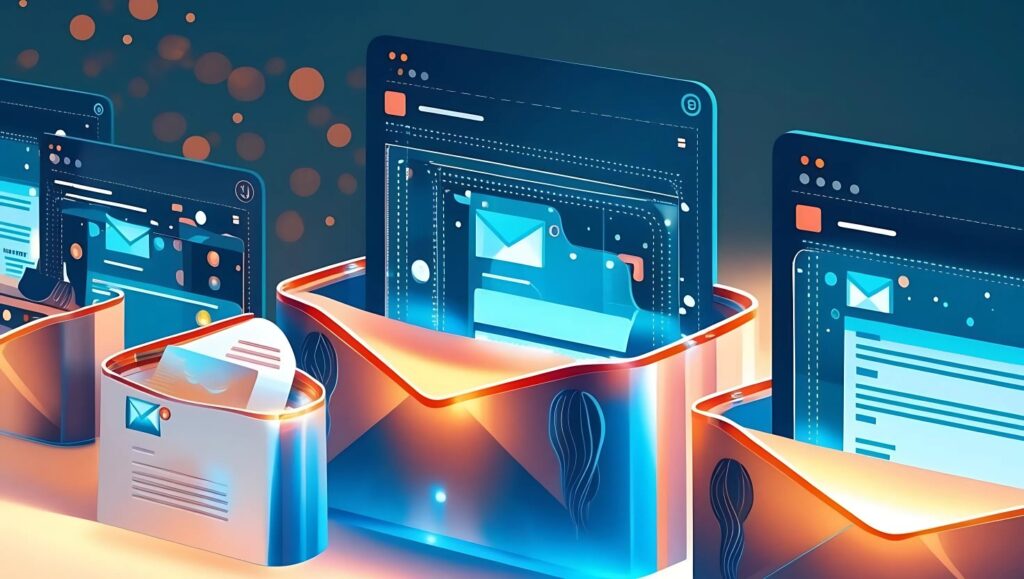Email marketing is one of the most effective ways to connect with customers, but generic, one-size-fits-all campaigns are no longer enough. In today’s competitive landscape, personalization is key to engagement and conversion.
AI is revolutionising email marketing by enabling brands to send behavior-triggered emails that are tailored to individual customer actions, preferences, and engagement history.
This blog explores how AI uses customer behavior data to automatically trigger personalised emails, boosting engagement, conversions, and ultimately, customer loyalty.
The Challenge: Generic Email Campaigns vs. Personalisation
Email marketing has long been a staple in digital marketing strategies. However, the approach many brands still rely on, generic, one-size-fits-all campaigns, is becoming increasingly ineffective. Customers today expect more than just a branded newsletter in their inbox; they want content that speaks directly to their individual needs and interests.
The Limits of Traditional Email Campaigns
Traditional email marketing typically involves bulk email blasts, where the same message is sent to thousands of recipients with minimal customisation. While this can generate some engagement, it often falls short when it comes to:
- Relevance: The email may not resonate with recipients because it lacks personalisation or speaks to a broad audience.
- Engagement: Generic emails are less likely to capture attention in a crowded inbox, resulting in low open and click-through rates (CTR).
- Conversion: Without targeted messaging, the likelihood of turning email recipients into customers diminishes.
The Shift Toward Personalisation
Research shows that personalised emails are far more effective than generic ones. In fact, brands that use personalisation in their email marketing see an average 26% increase in revenue. Personalisation can take many forms, such as:
- Using the recipient’s name in the subject line or body.
- Tailoring the offer based on past purchases or browsing behavior.
- Dynamic content that changes based on recipient data (e.g., location, interests).
But true personaliation requires more than just using a customer’s name. It involves using data-driven insights to understand customer preferences, behavior, and buying patterns, and then delivering relevant content at the right moment.
AI in Email Marketing: The Power of Behaviour-Triggered Emails
AI has taken personalisation in email marketing to a new level by enabling behaviour-triggered emails, automated, real-time emails based on customer interactions with your website, emails, or other marketing touchpoints.
How AI Enhances Personalisation
AI takes personalisation beyond basic demographic data. By analysing vast amounts of behavioural data, AI can make real-time decisions and trigger emails that are relevant to each individual based on actions like:
- Browsing behaviour: What pages or products customers are viewing
- Purchase history: What items they have bought or abandoned in their cart
- Email engagement: How often they open, click, or engage with your emails
- Time-based actions: Actions like completing a sign-up or hitting a milestone in a loyalty programme
The result? Emails that feel as if they were written specifically for the recipient, offering tailored content, product recommendations, and even special offers that align with their interests and needs.
Behaviour Signals That Trigger Emails
AI-driven email platforms continuously monitor customer behaviour across various touchpoints, using this data to trigger the right message at the right time. Some common behaviour signals include:
- Abandoned cart: AI can immediately send a reminder email with personalised product recommendations to increase the chance of completing the purchase.
- Product view: If a customer browses a product but doesn’t purchase, AI can trigger an email with that product, or similar items, within hours or days.
- Customer re-engagement: If a customer hasn’t opened an email or made a purchase in a set period, AI can send a re-engagement email with exclusive offers or content.
- Post-purchase follow-up: After a purchase, AI can send emails with related products or ask for reviews, enhancing customer loyalty and encouraging repeat purchases.
Real-Time Data Utilisation
Unlike traditional email campaigns, which are often scheduled in advance, AI-based triggered emails occur in real time, allowing for immediate engagement after a specific action. This real-time approach enhances the customer experience by addressing their current interests or needs when they are most relevant.

The Framework: How AI Triggers Personalized Emails
The power of AI in email marketing lies in its ability to trigger personalized emails based on real-time customer data and behaviours. By automating the process, AI ensures that emails are not only relevant but delivered at the optimal time, increasing engagement and conversion rates.

Here’s how the process works, step-by-step:
1. Data Collection: Understanding Customer Behaviour
AI begins by gathering data from multiple sources, such as:
- Website interactions: What pages or products a customer has viewed
- Purchase history: Previous transactions or cart abandonment
- Email engagement: How a customer interacts with past emails (opens, clicks, etc.)
This data is collected in real time, enabling AI to build a comprehensive customer profile without manual input.
2. Behavior Analysis: Predicting Intent and Scoring
Once the data is collected, AI uses predictive models to understand the customer’s intent. For example, if a customer has viewed a product multiple times but hasn’t made a purchase, AI may predict that they are close to making a decision. The system assigns scores to each customer interaction, determining the likelihood of a future action, such as making a purchase or re-engaging with the brand.
3. Email Segmentation: Targeting the Right Audience
AI automatically segments customers into different groups based on their behavior. These segments can include:
- Abandoned cart users: Customers who left items in their cart
- Repeat buyers: Those who frequently purchase or browse specific products
- Inactive users: Customers who haven’t engaged in a while
AI ensures that customers only receive emails that are relevant to their behavior and preferences.
4. Personalised Email Trigger: Crafting the Message
Once the customer has been segmented, AI personalises the email content by:
- Customizing the subject line based on previous interactions or interests
- Dynamic content: Tailoring product recommendations, offers, and CTAs based on customer data
5. Send Email: Optimising Timing and Delivery
AI also ensures that the email is sent at the optimal time based on when the customer is most likely to engage, improving open rates. By automating the entire process, AI delivers real-time, personalised experiences at scale.
Real-World ROI: Impact of AI-Driven Personalisation
Implementing AI-driven, behaviour-triggered emails can significantly enhance a brand’s email marketing efforts. From improving engagement to boosting conversions, the return on investment (ROI) can be substantial. Here’s how AI personalisation directly impacts key email marketing metrics:
1. Increased Open Rates
Personalised subject lines have been shown to increase open rates by as much as 50% compared to generic subject lines. AI can optimise subject lines in real time, ensuring they resonate with individual preferences based on the customer’s past behaviour.
2. Higher Click-Through Rates (CTR)
AI-driven emails have more dynamic and targeted content, which increases CTR. For instance, personalised product recommendations or content tailored to a customer’s browsing history can result in a higher likelihood of clicking through to the website.
Case Study: A well-known e-commerce brand that implemented AI-powered product recommendation emails saw a 30% increase in CTR and a 25% higher conversion rate compared to traditional campaigns.
3. Improved Conversion Rates
AI enables real-time email triggers based on specific actions, such as cart abandonment or a product view. By sending the right message at the right time, AI leads to higher conversion rates.
Example: A global retailer using AI for cart abandonment emails reported a 20% increase in recovery rates, successfully turning abandoned carts into completed purchases.
4. Cost Efficiency
AI reduces the manual effort and resources needed for segmentation, data analysis, and email creation. What once took hours to segment and personalise now happens almost instantly, allowing marketing teams to focus on high-level strategy.
5. Enhanced Customer Retention
Personalised emails also lead to higher customer retention rates. AI can continuously analyse customer behaviour and send targeted emails that keep customers engaged, whether through loyalty rewards, personalised offers, or follow-up content.
Traditional vs AI-Driven Personalisation ROI
| Metric | Traditional Email Marketing | AI-Driven Email Marketing |
| Open Rates | 10-15% | 25-50% |
| Click-Through Rates (CTR) | 1-2% | 5-8% |
| Conversion Rates | 1-2% | 5-12% |
| Customer Retention | 15-20% | 30-40% |
| Cost per Campaign | $250-$500 | <$50 |
AI-driven personalisation leads to more relevant and timely emails, which ultimately result in higher engagement, increased conversions, and long-term customer loyalty. The return on investment becomes clear when you look at the metrics.

Key Use Cases: AI-Triggered Emails Across Industries
AI-driven personalised emails are a game-changer across various industries. By leveraging real-time data, AI ensures that every email sent is timely, relevant, and aligned with customer intent. Below are key use cases across multiple sectors where AI is making a significant impact.
E-commerce: Abandoned Cart Recovery & Product Recommendations
In e-commerce, abandoned cart recovery is one of the most impactful areas for AI. When a customer leaves items in their cart, AI can trigger an email that:
- Reminds them of the items left behind
- Personalises the message with product recommendations based on their browsing or purchase history
AI-driven recommendations ensure that each email is highly relevant to the individual customer’s interests, increasing the likelihood of conversion.
Example: A major online retailer used AI to trigger abandoned cart emails with tailored product suggestions. The result was a 20% increase in recovery rates, recovering sales that would have otherwise been lost.
SaaS: Onboarding & Upselling Emails
For Software-as-a-Service (SaaS) companies, personalisation can significantly enhance user engagement. AI can send:
- Onboarding emails with personalised steps based on the user’s activity
- Upselling or cross-selling emails offering relevant features or add-ons, triggered by user behaviour (e.g., frequent use of specific tools within the app)
These emails are sent based on user engagement patterns, improving customer retention and increasing lifetime value.
Example: A SaaS company used AI to send users a series of tailored onboarding emails, resulting in a 30% increase in product adoption within the first month.
Retail: Loyalty Program Engagement
Retail brands can use AI to engage customers in loyalty programs. AI analyses past purchasing patterns and customer loyalty levels to trigger:
- Reward updates
- Exclusive offers
- Personalised discount emails
These personalised emails ensure that loyal customers feel valued and are encouraged to return.
Example: A global retailer integrated AI-driven email campaigns into their loyalty program, resulting in a 15% increase in repeat purchases and a 10% boost in loyalty program sign-ups.
Healthcare: Appointment Reminders & Post-Treatment Follow-Ups
In the healthcare sector, AI-triggered emails can be used for:
- Appointment reminders based on patient scheduling data
- Follow-up emails after treatments, offering relevant health tips or promotions for additional services
By sending timely and personalised reminders, healthcare providers can reduce missed appointments and keep patients engaged with their healthcare plans.
Example: A healthcare provider used AI to send appointment reminders and follow-up emails, reducing no-shows by 25% and increasing patient satisfaction.
AI-triggered emails are driving remarkable results across industries. By leveraging real-time data and personalisation, businesses can enhance customer engagement, increase sales, and improve overall customer retention.
Critical Considerations When Implementing AI for Email Personalisation
While AI-driven email personalisation offers immense potential, successfully implementing it requires careful planning and consideration. Organisations must ensure that the technology aligns with their business goals, complies with regulations, and optimises the customer experience. Here are the key considerations to keep in mind:

1. Data Privacy and Compliance
AI-driven email personalisation relies heavily on customer data. It’s crucial for businesses to adhere to data privacy laws such as the GDPR (General Data Protection Regulation) in the EU or CCPA (California Consumer Privacy Act) in the US. Ensuring that customer data is collected, stored, and used ethically is not only legally required but also critical to maintaining customer trust.
- Action Point: Ensure that data collection processes are transparent and customers have control over their data preferences (e.g., opt-ins and opt-outs).
2. AI Model Training and Accuracy
AI systems rely on high-quality, clean data to make accurate predictions and decisions. Businesses must invest in training AI models with accurate, relevant data to improve the system’s performance and ensure that the right triggers are activated at the right time. Inaccurate predictions or irrelevant content can lead to disengagement and reduced conversion rates.
- Action Point: Continuously refine AI models using feedback loops and ensure they are regularly updated with fresh data to improve their predictive capabilities.
3. Personalisation vs. Over-Personalisation
While personalisation is key to engagement, over-personalisation can backfire. Overly tailored emails may feel intrusive, making customers uncomfortable with the perceived level of tracking. Balancing relevant content with subtlety is essential.
- Action Point: Maintain a balance between personalisation and privacy, ensuring that emails are helpful, not intrusive. Avoid overloading customers with too much personal data in the content.
4. AI Transparency and Trust
To build trust, it’s important to communicate openly with customers about how their data is being used. AI-powered systems should be transparent in their approach, with clear explanations of why customers are receiving specific emails based on their behaviour.
- Action Point: Provide clear communication about AI-driven initiatives, particularly when it comes to personalised recommendations or targeted offers.
5. Testing and Optimisation
AI-driven emails must be continuously tested and optimised for performance. AI may handle email creation and sending, but regular A/B testing and performance analysis are essential to improve open rates, click-through rates, and conversions.
- Action Point: Continuously monitor and test different elements of AI-driven emails (e.g., subject lines, content, CTAs) to refine and optimise campaigns.
6. Human Oversight
Despite the automation provided by AI, human oversight remains critical. Marketers should ensure that AI-generated content aligns with the brand’s tone and strategy, and that it’s free from errors or misunderstandings. Human involvement can help maintain the creative edge that AI alone may lack.
- Action Point: Combine AI automation with human checks to ensure quality and consistency in email campaigns.
Implementing AI for email personalisation requires careful attention to data privacy, model accuracy, and customer experience. By ensuring that AI is used thoughtfully and transparently, businesses can harness its full potential without compromising customer trust.
Conclusion: Personalising Emails at Scale with AI
AI-driven email personalisation is a powerful tool for businesses looking to engage customers with relevant, timely content. By automating the process of behaviour-triggered emails, AI enhances engagement, increases conversions, and improves customer loyalty. As AI continues to evolve, its ability to deliver hyper-personalised, real-time emails will become a crucial component of successful marketing strategies.
Ready to supercharge your email marketing with AI? Leverage the power of personalisation and elevate customer experiences at scale. Get in touch with us.


